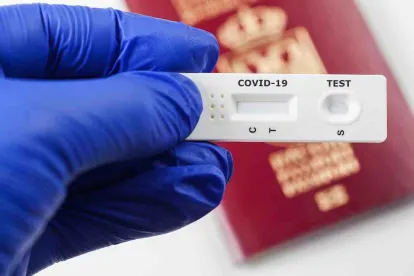Over the last two years, employers have followed the evolving laws and guidance issued by federal, state, and local governments and public health authorities. On July 12, 2022, the Equal Employment Opportunity Commission (EEOC) made several noteworthy revisions to its guidance to address changing pandemic conditions. Even though the COVID-19 pandemic may have subsided in various areas in the country, it is important for employers to remain up-to-date on such changes as they could have a significant impact on employers’ rights and responsibilities under the law.
New Parameters for COVID-19 Testing
Most significant, the EEOC has altered its guidelines surrounding workplace COVID-19 testing. Under the recent guidance, the EEOC will no longer presume that COVID-19 testing is job-related and consistent with business necessity – as required by the Americans with Disabilities Act. Instead, employers will be required to conduct an individualized assessment to determine whether present pandemic circumstances and individual workplace circumstances justify COVID-19 testing of employees. This individualized assessment is not new; the EEOC is simply returning to its pre-pandemic guidance on this issue. In those circumstances requiring an individualized assessment, the EEOC advises employers to consult current guidance from the Centers for Disease Control and Prevention (CDC) and other public health authorities. Furthermore, the EEOC instructs employers to evaluate and consider various factors including, among other considerations:
-
the level of community transmission
-
vaccination data
-
information regarding variants
-
the speed and accuracy of testing
-
the types of contacts between employees and others in the workplace (e.g., whether vulnerable populations are involved)
-
the potential impact on operations if an employee enters the workplace with COVID-19
The EEOC’s revised guidance also reemphasizes that, consistent with current CDC guidelines, antibody tests are not indicative of a current COVID-19 infection and should not be used to determine whether an employee can re-enter the workplace.
Other COVID-19 Screening Still Permissible
Notwithstanding the EEOC’s new guidelines surrounding COVID-19 testing, the EEOC reiterates that employers may continue screening employees who are physically entering a worksite with regard to COVID-19 symptoms or diagnoses, but should not screen employees who are working remotely or not physically interacting with coworkers or others.
In addition, the EEOC clarifies that employers may screen job applicants for COVID-19 symptoms after making a conditional job offer, as long as it does so for all employees entering the same type of job. However, an employer may only withdraw a conditional job offer because an applicant tests positive for COVID-19, has symptoms of COVID-19, or has been recently exposed, if three conditions are met:
-
the job requires an immediate start date;
-
CDC guidance recommends the person not be in proximity to others; and
-
the job requires such proximity to others, whether at the workplace or elsewhere.
According to the EEOC, employers may also screen applicants for COVID-19 during the pre-offer stage, but only if the employer screens everyone (including visitors) for symptoms of COVID-19 before entering the workplace, the applicant needs to be in the workplace as part of the application process, and the screening is limited to the same screening that everyone else undergoes.
Lastly, according to the EEOC’s guidance, employers may require employees to provide a doctor’s note clearing them to return to work after having COVID-19. Employers are reminded that they may also rely on other alternatives to determine whether it is safe for an employee to return to work (e.g., following current CDC guidance).
***
The EEOC’s updated guidance might signal a return to the pre-pandemic guidelines, standards, and enforcement of the agency. Over the last two years, the guidelines and rules changed rapidly in the face of a global health crisis, and many of the restrictions around the collection of medical information and medical testing and exams were significantly relaxed. Over the next few months, these guidelines and rules may change, and if they do, employers should ensure they are up-to-date with the guidelines and rules and that all policies and protocols, especially screening and testing protocols, are consistent with the most recent guidelines and rules.



 />i
/>i
